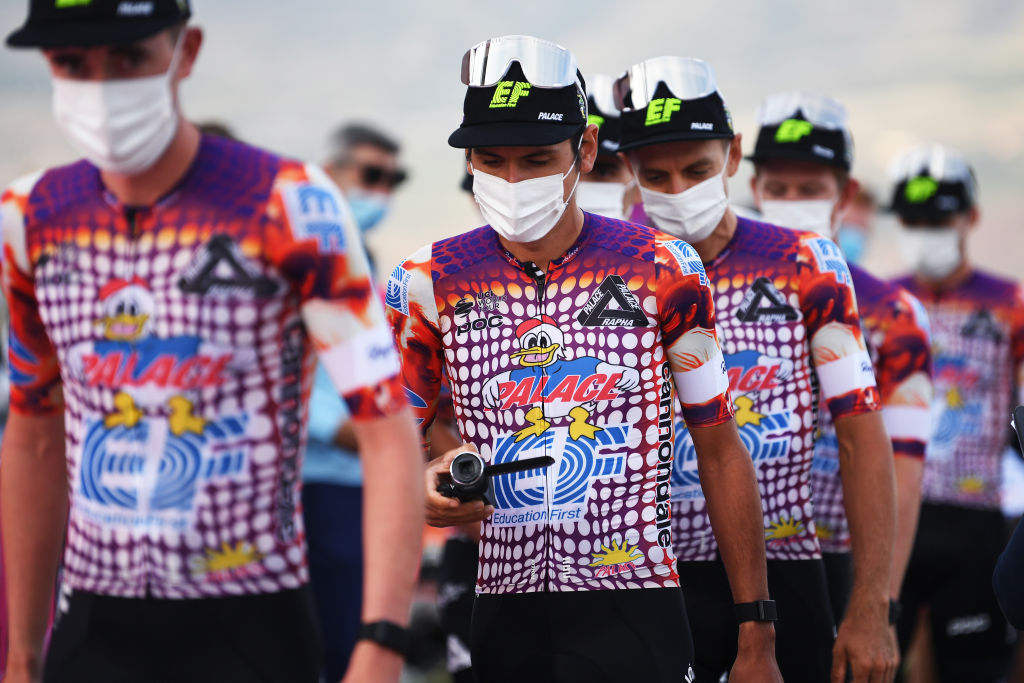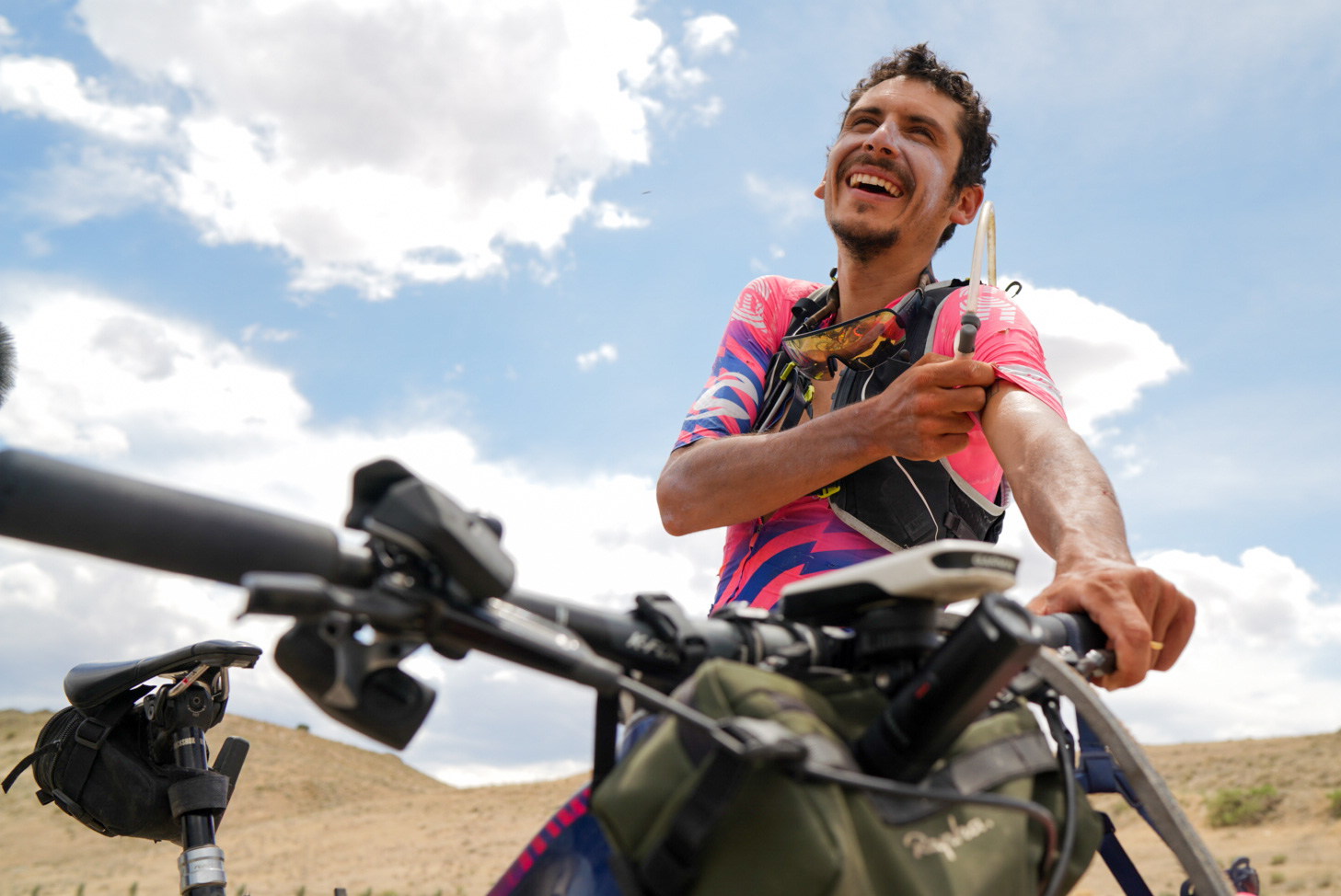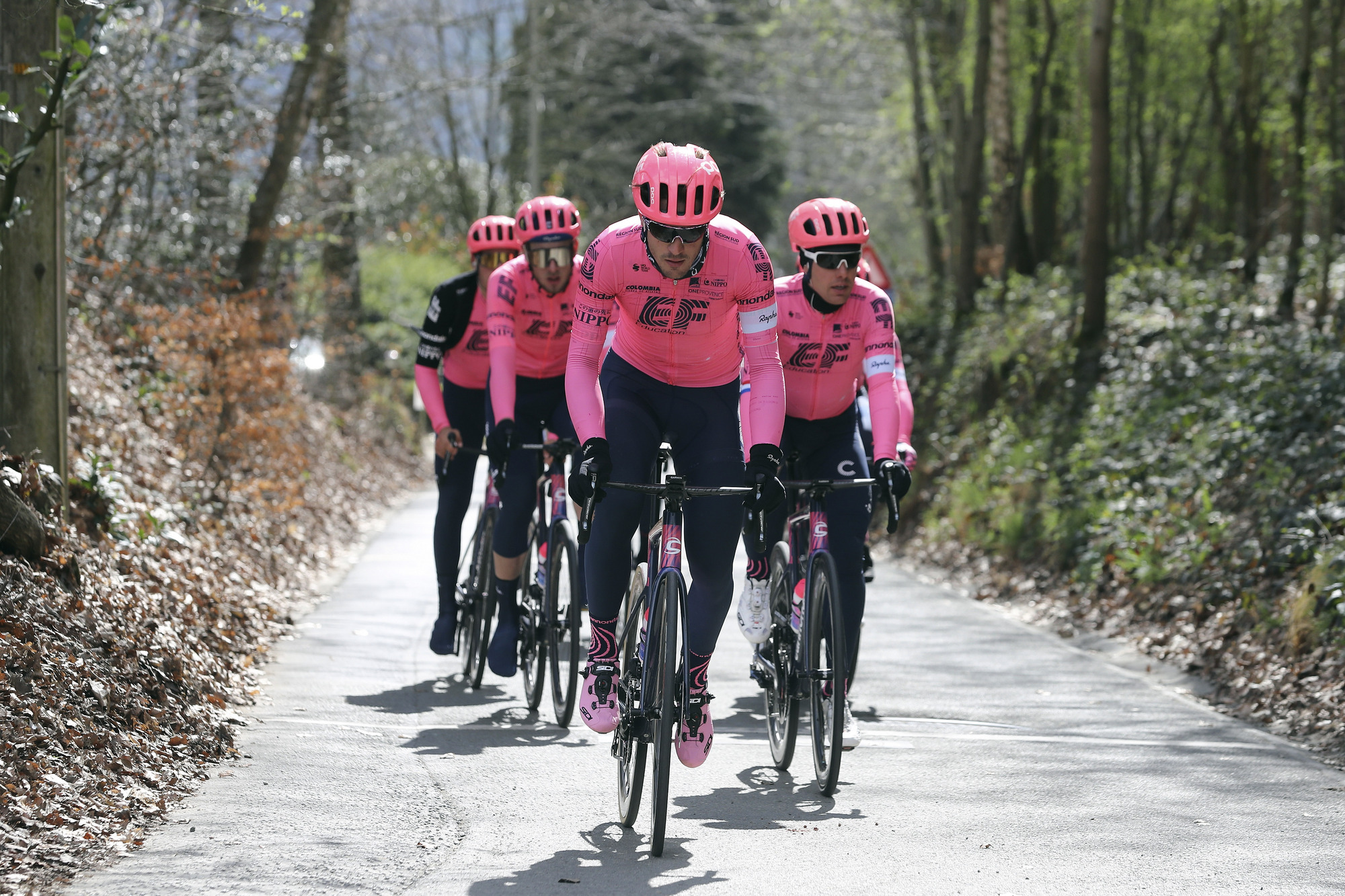Avoiding the rat race: How EF-Nippo are punching above their weight
Vaughters on 'inspirational' Morton, choosing Carthy over Martínez, and keeping sponsors happy in a pandemic

Last year was a tumultuous season for everyone involved in professional cycling. The racing scene was decimated due to COVID-19 restrictions, while teams struggled to give their backers any return on investment until the late summer. That meant that the fragility of the teams’ financial foundations were tested to the extreme, with sponsors walking away, riders left unpaid and several squads either folding or teetering on the edge.
For EF Education-Nippo, as they are named in 2021, last season was a tough pill to swallow, just as it was for everyone else. However, the American squad came away with some of their best results in years. They also attracted new sponsors and made headlines through a combination of clever marketing and their continued shift towards gravel and other less traditional areas of the sport.
Despite missing the financial clout of most of their rivals, Jonathan Vaughters, team manager and CEO, also played the transfer market and has built one of the most eclectic teams on the circuit.
"2020 was hard," Vaughters says with a degree of resignation.
"Every minute of every day was hard from a team perspective. I don’t know if I can think of one specific moment when it was do-or-die in terms of the team’s future, but it was just a really painful year all the way around, honestly. It was really tough, but we’ve been adapting to the changing environment, like so many of us have across the world. I just feel very fortunate that we’re here, doing what we love, honestly."
One of the reasons the team were able to thrive in the last 18 months is because of Lachlan Morton. While the Australian rider obviously doesn’t make boardroom decisions or win a stack of races, his approach to racing, and cycling in general, has transformed how Vaughters thinks about the sport and the constant demands of the WorldTour.
It’s a stark transition from where Vaughters, and his viewpoint on Morton, stood a few years ago. About a decade ago, at a dinner ahead of the Tour de France route presentation, Vaughters waxed lyrical to journalists about the wonders of a young Morton, having witnessed his latest protégé wipe the floor against established pros at the Tour of Utah. Vaughters was convinced that he had found the rider who would one day win his organisation the Tour de France.
Get The Leadout Newsletter
The latest race content, interviews, features, reviews and expert buying guides, direct to your inbox!
Fast-forward to the present day and things haven’t exactly panned out as Vaughters first thought. Morton initially dropped down the pecking order at Slipstream Sports before sinking two divisions to Jelly Belly Pro Cycling Team and, while that might have been the beginning of the end to some, Morton found his calling and has carved out a niche that involves elite road riding and his off-road adventures.
In one sense, and for a new audience, Morton has refined the parameters of what it means to be a typical road rider. For the boss himself, Morton’s pathway has pointed to a valuable lesson when it comes to judging talent and harnessing personality.
"Lachlan is a lynchpin. He’s been spearheading the direction within our team and we’re supportive of his initiatives. He’s reinventing what it means to be a pro cyclist and we’re just lucky enough to be along for the ride," Vaughters said before giving a much deeper context as to what Morton represents.
"He’s not that rider I thought he was all those years ago, and he doesn’t want to be, either. Back in 2014, I would have seen his cycling career as a letdown. Here was a guy who had a massive amount of talent and who could climb with the best in the world. He had all the tools to become a top rider, but he just didn’t seem committed to it then.
"That was my thinking eight years ago. I would have viewed that as disappointing, but I’ve been able to revisit that perspective because he’s giving a lot to the sport, it’s just that he’s doing it in his own way and style. He’s still a great bike racer, he just wants to do it in his own way," Vaughters explains.
"He basically taught me that more wins don’t necessarily mean more value for the sponsor or the team. In the last couple of years, he’s taught me to connect the bridge between the recreational community and the professional community. He brings so much more to the table as an athlete who can do that, and he has the persona to match. He is truly an inspirational cyclist."

That notion was never more real than when Morton made the cover of the Wall Street Journal in 2020 after setting an Everesting world record, while a win for the team in the Critérium du Dauphiné was on television but only made headlines in the niche world of cycling publications.
"We figured out fast that to keep our fan base happy and to draw in new fans, we needed to be relatable and understandable by the broader audience," Vaughters says. "We want to give fans something that’s immediately digestible so that they can relate to us and go Everesting if they want. Last spring, Alex [Howes] rode from Colorado to Kansas and Lachlan also went out and set a new fastest known time out in the Utah/Colorado desert on the Kokopelli Trail. We want to inspire people to get out there."
Then came the Giro stunt, with the team unveiling a garish new kit ahead of the race. They broke UCI rules in doing so and took a small fine as punishment but the publicity they gained from the exercise was huge – both in terms of general exposure but also when it came to opening talks with other potential backers.
"The Palace jersey generated more sponsorship interest than anything else we did during the entire year so it was immensely valuable, but again if we didn’t back it up with winning at the Giro then it falls a little flat," Vaughters said.
"So if we only do the jersey, or if we have 15 different nationalities on your team coming together but you don’t win at all, that also falls flat. The magic is about bringing that all together."
Transfer mechanics
Bringing it all together also meant being smart in the transfer market and making some bold decisions. Teams with modest budgets like EF need to find ways of providing relevance for their sponsors and their fans but if you’re Jumbo-Visma, Deceuninck-QuickStep, or Ineos Grenadiers you can simply smile smugly and point to your win count to explain your team’s success and relevance.
However, if you don’t have the financial resources to compete and you’re not financed by a state project, then the transfer market becomes an entirely different proposition. As a result, Vaughters has moved away from the days of chasing superstars he can barely afford and instead built a team that has depth and personality to it.
The days of chasing riders with the stature of Chris Froome and Alberto Contador seem to be firmly over and instead the team focuses on young talent, riders who need a second chance, or athletes like Morton who speak to a wider audience than your typical pro.
"We didn’t and couldn’t chase any high-priced riders in the market last winter," Vaughters says. "We’re functioning on a modest budget and that’s the direction where cycling is going but we’re also a team that’s socially responsible, is good at storytelling and is good at appreciating under-appreciated riders that have fallen off the scene. We’re bringing a degree of cultural diversity and those things are what’s drawing people into cycling."
The COVID-19 pandemic made the financial realities within the transfer market even more acute. The team offered everyone on their books in 2020 a deal for 2021 – but on reduced terms – while their marquee signing was Michael Valgren, who they picked up on the cheap after two poor years at Dimension Data. Several high-profile riders were allowed to leave, including Dani Martínez, Michael Woods, Sep Vanmarcke and Simon Clarke and, with 15 riders on the books last summer, the team were able to take a more diverse approach.
Along with Valgren, they snapped up several riders as part of the Nippo sponsorship, including the impressive Simon Carr, Julien El Fares, Hideto Nakane and the hugely experienced Fumiyuki Beppu. Will Barta was thrown a WorldTour lifeline while Vaughters once again scoured the American market for fresh talent. Hugh Carthy was extended, and Rigoberto Urán, who Vaughters calls the 'Godfather' of the team, was given another one-year deal.
"I’ve been asked a lot if I’m bummed out about losing Michael Woods, and I’m not. I can’t be," Vaughters says. "And not because Mike isn’t a good person and good racer, it just wasn’t a deal we could make.
"I’m more interested in what young under-appreciated rider I can dig up for the next chapter and how we can reinvent a team on a modest budget. That’s just the reality of how things are in 2021 and beyond. When Woods left there was just so much negativity and people wondering if I was crying in my bed after losing him. Sure I would have liked to have kept him but we didn’t have a big enough budget to retain a guy like that but that’s okay. We’re adapting to the new world.
"The toughest call, honestly, was maybe when I had to choose between Martínez or Carthy. And this was before the Tour but I made my bed, and I knew we couldn’t keep them both but I chose to let Dani go and stand firm on Hugh and up until that point at the Vuelta I think most people doubted me. Both riders had enormous offers from other teams, and it was up to me to decide which one we fought for."

There’s an obvious question as to whether a tighter budget and a desire to splinter their squad into areas such as gravel dilutes the team’s robustness when it comes to competing across three Grand Tours and the rest of the WorldTour campaign.
However, the results in 2021 have so far been decent. The team struggled in the cobbled classics due to injuries and illness but have still managed to pick up two WorldTour wins and some encouraging performances from the likes of Carr and Neilson Powless.
"That’s a concern," Vaughters admits when asked about thinning the roster. "And we have budgetary constraints that teams like Ineos or Jumbo don’t have so we have to look at how we can develop a maximum return on dollars spent for our sponsor.
"Is that about hiring rider X, who might perform slightly better than a Morton or a Docker in the WorldTour but has no presence outside of that box? To me, it’s a small compromise."
Keeping the sponsors happy
Much of what’s at the core of EF comes down to how the team measures success and there’s also an ever-increasing need to provide a return on the needs of your headline sponsors. If you’re Ineos, UAE, and Bahrain, it’s all about winning and prestige, while for teams with a more regionalist base, like Jumbo or QuickStep, it’s about win tallies and talking directly to your audiences in specific territories.
Vaughters believes that his team fits into an altogether different sector.
"Our business model has to function on a globally relevant stage and in a manner that makes sense for a global company’s marketing strategy. There aren’t that many teams that are doing that right now.
"When Dan Martin won Liège-Bastogne-Liège for us in 2014 I called the CEO of Garmin and told him we’d won a Monument. His response was to ask if it was a qualifier for the Tour. The point is that winning Liège, from a marketing perspective, had zero impact on them. Sure, in NFL or soccer it’s a lot more about your win/loss ratio but in a sponsorship-driven sport it’s about what value you’re bringing to the sponsor. You can do that in a lot of ways but you need to consider who is supporting you and what do they want."
There's also the aim of trying to run an operation that's fundamentally sustainable and responsible. Vaughters admits that if a sponsor were to double his budget and ask him to put together a Tour-winning team then the conversation would change but the reality is that American sponsors are hard to attract and that international markets aren't exactly bursting with potential benefactors at this point either.
While a small handful of teams continue to expand and build on already impressive arsenals, teams below them need to be smarter than ever when it comes to creating relevance and success.
"We’re one of the smaller budgets in the WorldTour. Bottom five, but we were never that big to begin with. But from a budget point of view, I think that what we’re doing right now is the right thing to do during a global pandemic. We’re paying everyone, we’re paying them fairly and we’re doing a great job with what we’re given," Vaughters says.
"Do I think a 60 million budget is sustainable or honourable, given the global environment? The answer is no. It’s just not. What we’re doing is more in line with where the world is right now.
"But at the core of it all, we’re an American team with more international riders on our team than any other. EF are Swedish founded, and Swiss-based, we have a Japanese secondary sponsor and then tertiary sponsors in France and Colombia. It’s more culturally diverse than any other WordTour team and I think that’s really interesting. We all learn things from each other all the time.
"Philip Hult, the Chairman of EF Education First, told me that the thing about winning the rat race is that no matter what, you’re still a rat. That’s true and I feel like there’s a more responsible way of running a cycling team than running a 50 million dollar behemoth in this environment. EF mainly supports students and teachers, and we want to give our sponsors something responsible and interesting in return, rather than a giant steamroller that’s trundling down the road."
Daniel Benson was the Editor in Chief at Cyclingnews.com between 2008 and 2022. Based in the UK, he joined the Cyclingnews team in 2008 as the site's first UK-based Managing Editor. In that time, he reported on over a dozen editions of the Tour de France, several World Championships, the Tour Down Under, Spring Classics, and the London 2012 Olympic Games. With the help of the excellent editorial team, he ran the coverage on Cyclingnews and has interviewed leading figures in the sport including UCI Presidents and Tour de France winners.
